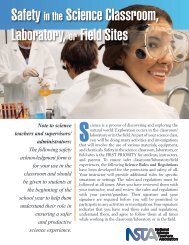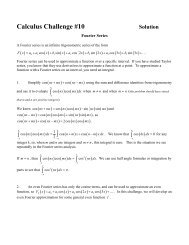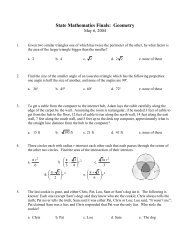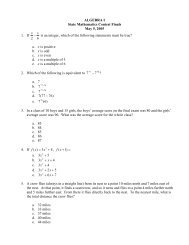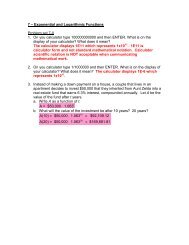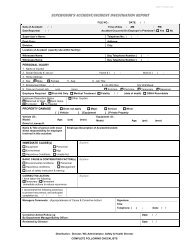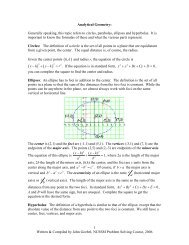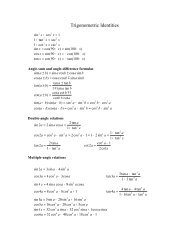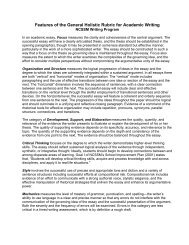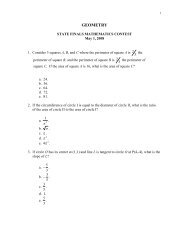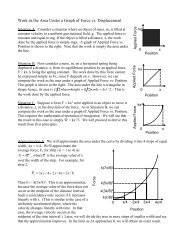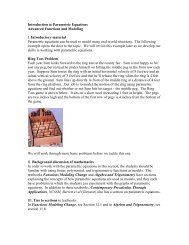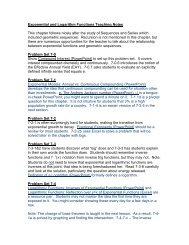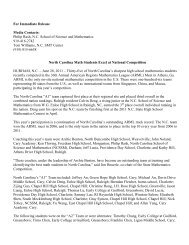NCSSM COURSE CAtAlOG - North Carolina School of Science and ...
NCSSM COURSE CAtAlOG - North Carolina School of Science and ...
NCSSM COURSE CAtAlOG - North Carolina School of Science and ...
You also want an ePaper? Increase the reach of your titles
YUMPU automatically turns print PDFs into web optimized ePapers that Google loves.
<strong>COURSE</strong> OFFERINGS: Physics<br />
Graduation Requirement in Physics<br />
The graduation requirement in physics may be fulfilled by one <strong>of</strong> these <strong>NCSSM</strong><br />
physics courses or course sequences: PH307 Physics, PH355 Physics with<br />
Advanced Topics, or PH404 AP Physics C: Mechanics (I)/PH406 AP Physics C:<br />
Mechanics (II)/Electricity <strong>and</strong> Magnetism (I).<br />
Placement<br />
Junior students’ physics placement is based on scores on the <strong>NCSSM</strong> physical<br />
science placement test <strong>and</strong> <strong>NCSSM</strong> mathematics placement, <strong>and</strong>, for PH404<br />
AP Physics C: Mechanics (I), on an <strong>NCSSM</strong> physics placement test. Senior<br />
students’ physics placement is based on their performance in <strong>NCSSM</strong> science<br />
<strong>and</strong> math courses in the junior year, their senior year math placement, <strong>and</strong>, for<br />
certain courses, on a placement test. Students who have completed, or are<br />
taking, MA430 AP Calculus BC (Advanced Topics I) or higher mathematics are<br />
placed in PH355 Physics with Advanced Topics PH307 Physics <strong>and</strong> PH355<br />
Physics with Advanced Topics are honors-level physics courses that require no<br />
previous experience in physics.<br />
PH304 Astronomy<br />
One trimester<br />
Credit: One unit core elective credit.<br />
Meeting pattern: Four periods per week or two 90-minute evening class<br />
meetings.<br />
This introductory astronomy course focuses on using observations to create<br />
predictive models. Physics <strong>and</strong> chemistry concepts are introduced as needed.<br />
Topics include the sky, seasons, phases <strong>of</strong> the moon, our solar system, <strong>and</strong> the<br />
search for extrasolar planets. Students use computers extensively to analyze<br />
data <strong>and</strong> access resources. Opportunities for telescope observations are<br />
available.<br />
PH307a/PH307b/PH307c Physics<br />
One year<br />
Credit: Three units core physics credit.<br />
Meeting pattern: Five periods per week including lab (trimester 1), Four periods<br />
per week including lab (trimesters 2 <strong>and</strong> 3).<br />
This course provides an algebra-based foundation in the processes <strong>of</strong> physics,<br />
with an emphasis on qualitative <strong>and</strong> quantitative reasoning. Topics explored<br />
include mechanics, wave motion, electricity, magnetism, <strong>and</strong> modern physics.<br />
Laboratory activities, which are a key component <strong>of</strong> the course, are inquirybased,<br />
meaning students design their own experiments in order to answer<br />
75



